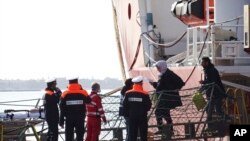Human rights groups have strongly criticized Italy for extending a deal with Libya that facilitates the return of migrants to detention centers. Many migrants have spoken of horrific conditions in the camps, with torture and rape commonplace.
Awudi Baluduzzi, 27, has experienced the brutality firsthand. He left his home in Ghana in 2015 with the dream of reaching Europe. He eventually arrived in Libya, where he was captured by a trafficking gang who demanded money for his release. When he couldn’t pay, they broke the bones in his hands.
"At that time, I didn't have money, so they started beating me every day, asking me to call my parents for the money,” Baluduzzi explained. “They started beating me all over my body. I called my mother. My mother put 1,500 Ghanaian cedi ($270) for them. Even (after) that 1,500, already they've beaten me.”
A smartphone and $1,200 bought Baluduzzi a place on an overloaded rubber dinghy across the Mediterranean Sea in 2019. The passengers were saved by the Ocean Viking, an aid agency rescue ship.
The European Union has sent more than 328 million euros ($360 million) to Libya, much of it funneled through United Nations agencies, to try to halt the flow of migrants across the Mediterranean. The EU money funds the Libyan coastguard and also is aimed at disrupting human trafficking networks.
The latest figures show the number of arrivals has fallen to its lowest level since 2013. But critics say it has come at a huge cost.
"It is the EU's aerial assets (spotter planes) which spot boats in distress, have contacted the Libyan coast guard allowing militias to intercept these people, return them into slavery and trafficking,” said Clare Daly, an Irish member of the European Parliament. “We talk about concern for human rights, and it is an absolutely doublespeak and hypocrisy. And I'm getting frankly sick of it at these meetings, because we hear an awful lot about it. We are the ones culpable in this.”
More than 40 migrants were killed in an airstrike on a detention center in July 2019. No one has yet admitted responsibility. There are growing fears that migrants will be caught up in Libya’s civil war.
Separate from the EU programs, Italy this week agreed to a three-year extension to a deal it struck with Tripoli in 2017 which facilitates the return of migrants to detention centers. Amnesty International says the agreement makes Rome complicit in the abuse.
"We have to expect three more years of interceptions at sea by the Libyan coast guard. Three more years of people being detained in those awful detention centers. Three more years of Europe looking on the other side pretending this is not happening just because this is helping them stop people coming to Europe,” Amnesty’s Matteo de Bellis told VOA.
The migrants continue to leave Libyan shores. The Ocean Viking rescued over 400 migrants in just three days last week.
The EU says it is not involved in funding detention centers in Libya and is focused on improving conditions for migrants in the country.






